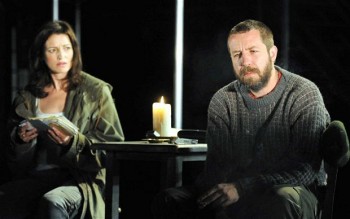| Theatre review: Silence |
 |
 |
 |
| Friday, 27 May 2011 08:52 |
|
1991. New post Communist optimism. Poll tax riots and a long standing Tory leader overthrown. The world is in turmoil and the authorities react heavy handily. But is the mobilisation of people motivated by challenging oppression or is it as much about our inability to come to terms with ourselves? It’s the question and premise of Silence, a new work devised by the company Filter and directed by RSC director David Farr.
“I have a ringing in my ears. It’s a high pitched whine…my brain imagines sound where there isn’t any. Instead I have filled my life with more noise to get rid of it – music, clubs, television, chatter of people…” says Kate, the play’s protagonist, in her opening lines.
Played by Katy Stephens, Kate is the lynch pin of a production which straddles the present day with the early 1990s, connecting two communities (and therefore also the two eras.) She now lives in London with husband Michael, played by Oliver Dinsdale, but back then, she was a young idealist drawn by her Russian ancestry. On her way back from Moscow, she meets Alexi (Ferdy Roberts) and his business partner, Josef (Patrick Romer) and amidst the optimism and newfound freedom that the two young Russians experience, Kate and Alexi fall in love. Their union embodies the spirit of possibility but is cut short when Alexi is called to serve in the army. They agree to write every day, but their correspondence gets intercepted by the powers that be.
The story flicks between 1991 and the present day when Kate, returns to Moscow to seek out her former lover. Alexi, it turns out, was left irreparably damaged by his experiences in the army, betrayed by his partner and has now disappeared out of reach.
Back in England, Kate’s husband, Michael, is a freelance investigative film maker on the brink of a big break, as he strives to solve the murder of a militant activist, James Hansford in 1991. With the recent outing of Margaret Thatcher, Britain also faces new possibilities, but the police remain just as heavy handed in dealing with subversives. Michael and his assistant Peter (Jonjo O’Neill) manage to nail down Kenneth Barber, formely DI Barber (also played by Patrick Romer) who cracks and confesses to Hansford’s manslaughter. But his interview has been secured under false pretences. Will Michael achieve his ambition, despite his unscrupulous means? And will Kate ever find Alexi?
Ultimately Silence is a story of hope over tragedy and morality triumphing over ambition. It also hangs on people’s inability to face themselves; when the ensuing silence forces them to confront this, they seek distractions. The dreaded silence is there wherever you go, be it in the loneliness of a city apartment or against the chilly winds of a barren Russian landscape as the play shifts between both. In the final stages, Alexi realises that all that he classed as an enemy – the state, the secret police, communism, capitalism (as he hates both in equal measure, seeking instead a liberated third way) - is actually a battle with himself.
Although the play brings out these tales of emptiness and personal unhappiness, it’s not clear-cut and a somewhat confusing mesh of narratives ensues. This is especially so at the start when the whole point of the production seems lost. Just over half way through, it improves considerably when the different stories and their interconnectedness take root. It’s rather a long wait to get there though, and it could also be argued that such techniques of narrative hopping in time and location are better lent to film or a novel (in the vein of the Sebastian Faulk’s best Seller, A Week in December, that brings characters in London all living in their own bubbles together through circumstances.) In fact, the whole premise of “silence” is a little tenuous, which may be a result of the collaborative ways of working (via workshops etc) through which the production came about. This said, it’s an admirable venture with some clever quirks, and in line with the RSC’s direction for ensemble theatre making and a desire to reach out to wider audiences and new writing.
The play’s also helped by some very compelling acting and excellent stage direction. An innovative use of simple props means that metal poles morph seamlessly from microphones to lamp stands to rostrums as we switch between speeches being delivered, to Alexi and Kate’s bedroom in Moscow. And we are constantly reminded of the theme of noise and silence by the presence of a recording studio workshop on the second tier of the stage to which the actors retreat. It all comes together quite neatly. The close proximity of the audience to the stage at the Hampstead Theatre also means that we are obliged to engage with the tenseness of what’s presented to us. In turn, it forces the themes of the play back onto us, the audience, to reconsider. After all, what’s the real purpose of something that delves constantly into history, apart from considering the lessons we can learn from it today? And to this end, Silence makes us think about our own lives today; we’re once again faced with a world that’s about to turn on itself – public riots, economic turmoil, a sense of oppression where the masses are constrained and have to pay the price of mistakes made by the state and authorities. Out of this comes hope for a better world order. If Silence is anything to go by, it’s a hope worth clinging onto.
Silence played at the Hampstead Theatre. It’s followed immediately by an RSC commission of another new work, the world premier of American Trade by Tarell Alvin McCraney, that runs from June 2 –18th. |
| Last Updated on Friday, 27 May 2011 09:07 |



 By Shiroma Silva
By Shiroma Silva